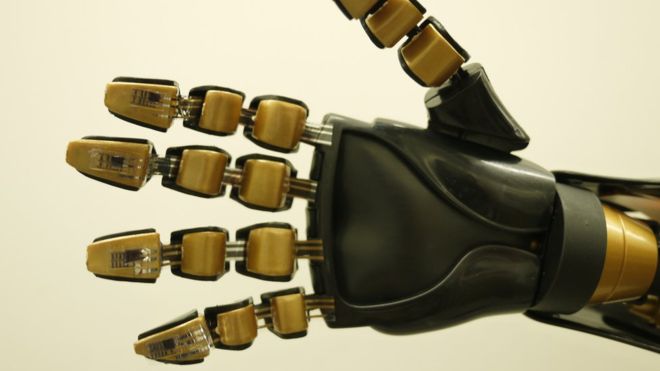Man and metal do not mix, however as clearly shown it is one of the biggest fields in medicine. Given the fact, that combining man and machine will never work, clearly shows that there is a deeper, darker reasoning behind this sort of “advancement”.
To put it economically, paying robots to do work is far cheaper than paying humans. So how do big CEO’s save tons of money while ridding the middle class, they create man-machines, robots, to do the work in place of humanity. Which creates a 2 class society, instead of a full prosperous, growing society with more than two categories. If technology keeps “advancing”, as a human race, there would be two types of people; slave, and master.
What happens is, these machines not only are effectively downgrading society, but they are also laying claim on your soul because iron and clay do not mix. Plus, to work or operate these limbs, an RFID chip, or a brain-implant, will have to be installed. This new ‘digital skin’ is also carving out the mark of the beast at the same time.
The advancement in technology is not for the benefit of humanity, but for the elite to control better. Having drones that do tasks, is far more efficient than a human with emotions. Especially if that work involves a firing squad, killing innocence, or even how a case is closed.

Engineers have built a flexible sensor that detects touch and, just like skin, produces electrical pulses that get faster when the pressure increases.
They have also used those pulses to drive neuronal activity in a slice of mouse brain.
They say the system is a more faithful replica of touch sensation than many other designs for artificial skin, making it a promising option for the development of responsive prosthetics.
The work appears in Science magazine.
The main advantage, according to senior author Zhenan Bao, is that the bendy, plastic-based sensor directly produces a pattern of pulses that makes sense to the nervous system.
Wearable tech
“Previously, with plastic material, we and others in the field have been able to make sensitive touch sensors – but the electrical signal that comes out from the sensor is not the right format for the brain to be able to interpret it,” she told the BBC.
That means that other designs, although they have produced some remarkable results in tests with patients, have required a processor or a computer to “translate” the touch information.
“Our sensor is now coupled with a printed, simple electronic circuit. That circuit allows our sensor to generate electrical pulses that can communicate with the brain,” said Prof Bao, a chemical engineer at Stanford University.
“We see this as the first step towards using plastic materials for artificial skin on prosthetic limbs.”
In the more near-term, she added, the sensors might prove useful in wearable technology.
Works Cited
Jonathan Webb. “'Digital skin' activates brain cells.” BBC. . (2015): . . http://www.bbc.com/news/science-environment-34539056




![[VIDEO] Drag Queen Drag Shows Are Now Infesting Churches](https://christianjournal.net/wp-content/uploads/2019/11/Screenshot-2019-11-22-at-9.02.01-PM-100x70.png)
![[VIDEO] Starbucks Worker Dumps Milkshake On Open Air Preachers Head](https://christianjournal.net/wp-content/uploads/2019/11/Screenshot-2019-11-22-at-7.23.43-PM-100x70.png)
![[VIDEO] Man Arrested For Threatening To Kill Female Abolitionist With Crowbar](https://christianjournal.net/wp-content/uploads/2019/11/MLock-1-100x70.jpg)


